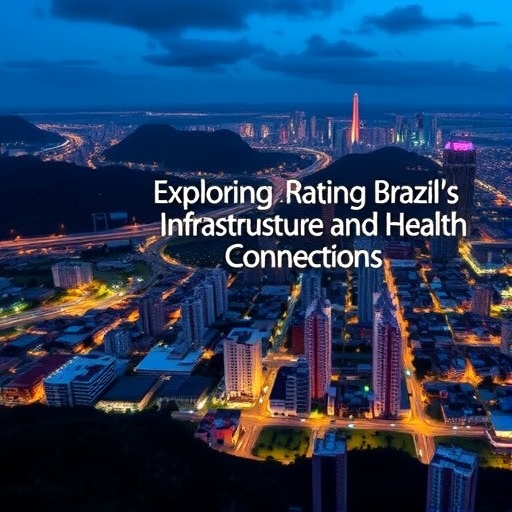In a compelling new study published in Global Health Research and Policy, researchers illuminate the intricate and often overlooked connection between infrastructure and health outcomes within Brazil. This comprehensive scoping review meticulously dissects how infrastructure—ranging from transportation networks to sanitation systems—plays a critical and multifaceted role in shaping public health dynamics across one of the world’s most diverse and populous nations.
Brazil presents a unique case study for examining this nexus, given its vast territorial expanse and pronounced regional disparities. The country’s socioeconomic inequalities translate into uneven access to vital infrastructure, which in turn exacerbates health inequities. This study exposes the complexity behind how physical structures and services directly influence disease prevalence, healthcare access, environmental health, and the overall quality of life of its citizens.
At the heart of this analysis is the recognition that infrastructural development cannot be uncoupled from health considerations. Whether in the dense urban metropolises of São Paulo and Rio de Janeiro or the remote Amazonian communities, the availability and quality of infrastructure determine not only the logistical feasibility of healthcare delivery but also the root social determinants of health such as clean water, waste management, and mobility.
The researchers underscore that transportation infrastructure, often taken for granted, holds profound implications for health equity. Reliable, affordable transport systems enable timely access to healthcare facilities, ensuring early diagnosis and treatment, which can mitigate disease progression and mortality rates. Contrastingly, in regions with inadequate transportation networks, delayed or foregone medical care perpetuates preventable illnesses and worsens health outcomes.
Sanitation and water supply infrastructures emerge as vital pillars in the prevention of communicable diseases. The study extensively documents how deficits in sanitation correlate strongly with outbreaks of waterborne illnesses, especially in Brazil’s impoverished peri-urban settlements and rural localities. This correlation is stark in areas where open defecation or antiquated sewage systems prevail, perpetuating cycles of infection and chronic health conditions.
Electricity and energy infrastructure, while less immediately obvious, have profound indirect effects on health. Stable electricity supplies are indispensable for maintaining refrigeration chains for vaccines, powering diagnostic equipment, and ensuring lighting and ventilation within health facilities. Interruptions in energy supply often precipitate disruptions in essential health services, which can lead to hospital overcrowding and compromised patient safety.
This comprehensive review also highlights the role of digital infrastructure in shaping modern health landscapes. The increasing adoption of telemedicine and electronic health records depends heavily on robust internet connectivity—a condition still unmet in several Brazilian regions. Bridging this digital divide is crucial for enhancing healthcare delivery, particularly in underserved areas.
Moreover, housing infrastructure quality is examined through the lens of its impact on respiratory diseases, mental health, and exposure to environmental hazards. Substandard housing conditions, marked by overcrowding, poor ventilation, and mold, are linked to higher incidences of asthma and depression, showcasing the interplay between environmental and psychological health factors.
The environmental impact of infrastructure development itself is a critical dimension of this analysis. Construction and expansion projects can disrupt ecosystems and water cycles, potentially leading to new exposures or amplifications of pathogens. The study proposes an integrative framework that balances infrastructural growth with ecological preservation to safeguard public health.
From a policy perspective, the research advocates for multidisciplinary collaboration, where urban planners, engineers, public health officials, and community stakeholders synergize efforts to design infrastructure that inherently promotes health equity. Policies must prioritize inclusive and sustainable infrastructure that mitigates regional disparities and anticipates future demographic and climatic shifts.
Brazil’s context amplifies the urgency for such integrated strategies given its vulnerability to climate change-induced phenomena like floods and droughts. Resilient infrastructure systems capable of withstanding these shocks are not just beneficial but essential for maintaining health services continuity and protecting vulnerable populations during crises.
The study’s methodology, a scoping review, gathers evidence from diverse sources to map out the breadth and depth of existing knowledge, identifying research gaps that future studies must address. This approach allows for a nuanced understanding of how different infrastructure components interplay within Brazil’s unique social and environmental landscapes.
Importantly, this research sets a precedent for other nations with comparable challenges—highlighting the critical, often understated need to view infrastructure not merely as economic or technical assets but as central determinants of health. It calls for a paradigm shift in global health interventions, where infrastructural investments are recognized as foundational to health system strengthening.
The study’s findings pave the way for innovation in public health strategies by integrating infrastructure considerations into national health plans. This integration promises more resilient health systems capable of achieving universal health coverage and improved population well-being.
Overall, this groundbreaking work from Martins and colleagues underscores that infrastructure is far more than physical constructs; it is a dynamic and potent force shaping health trajectories, equity, and social justice in Brazil. As the world grapples with increasingly complex health challenges, their insights offer crucial guidance on harnessing infrastructure for healthier, more equitable societies.
Subject of Research:
The interconnections between infrastructure and public health outcomes in Brazil.
Article Title:
Infrastructure-health nexus in Brazil: a scoping review.
Article References:
Martins, F.P., Vigurs, C., Veras, M.M. et al. Infrastructure-health nexus in Brazil: a scoping review. glob health res policy 10, 42 (2025). https://doi.org/10.1186/s41256-025-00441-x
Image Credits: AI Generated
DOI: https://doi.org/10.1186/s41256-025-00441-x




